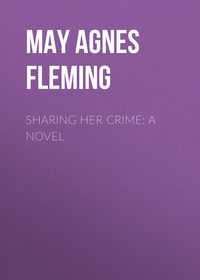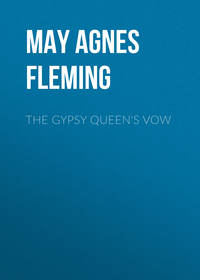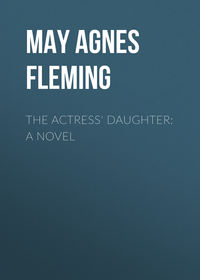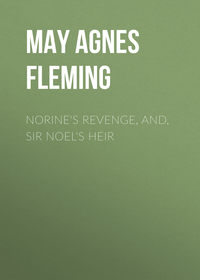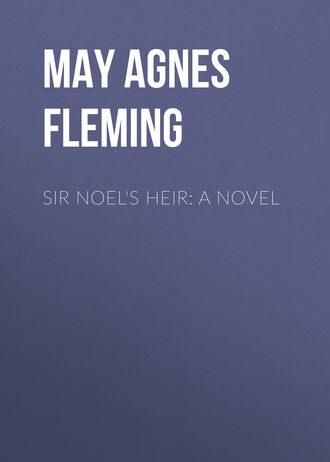 полная версия
полная версияSir Noel's Heir: A Novel
There was a moment's pause; then the lady asked, thoughtfully: "And when do you leave for New York?"
"The day after to-morrow, ma'am – and a long journey it is for a poor old body like me."
"Did you live here when Mr. Vyking left the child with you – in this neighborhood?"
"Not in this neighborhood, nor in London at all, your ladyship. It was Lowdean, in Berkshire, and my husband was alive at the time. I had just lost my baby, and the landlady of the hotel recommended me. So he brought it, and paid me thirty sovereigns, and promised me thirty more every twelvemonth, and told me to call it Guy Vyking – and that was the last I ever saw of him."
"And the infant's mother?" said the lady, her voice changing perceptibly – "do you know anything of her?"
"But very little," said Martha Brand, shaking her head. "I never set eyes on her, although she was sick at the inn for upward of three weeks. But Mrs. Vine, the landlady, she saw her twice; and she told me what a pretty young creeter she was – and a lady, if there ever was a lady yet."
"Then the child was born in Berkshire – how was it?"
"Well, your ladyship, it was an accident, seeing as how the carriage broke down with Mr. Vyking and the lady, a-driving furious to catch the last London train. The lady was so hurted that she had to be carried to the inn, and went quite out of her head, raving and dangerous like. Mr. Vyking had the landlady to wait upon her until he could telegraph to London for a nurse, which one came down next day and took charge of her. The baby wasn't two days old when he brought it to me, and the poor young mother was dreadful low and out of her head all the time. Mr. Vyking and the nurse were all that saw her, and the doctor, of course; but she didn't die, as the doctor thought she would, but got well, and before she came right to her senses Mr. Vyking paid the doctor and told him he needn't come back. And then, a little more than a fortnight after, they took her away, all sly and secret-like, and what they told her about her poor baby I don't know. I always thought there was something dreadful wrong about the whole thing."
"And this Mr. Vyking – was he the child's father – the woman's husband?"
Martha Brand looked sharply at the speaker, as if she suspected she could answer that question best herself.
"Nobody knew, but everybody thought who. I've always been of opinion myself that Guy's father and mother were gentlefolks, and I always shall be."
"Does the boy know his own story?"
"Yes, your ladyship – all I've told you."
"Where is he? I should like to see him."
Mrs. Brand's daughter, all this time hushing her baby, started up.
"I'll fetch him. He's up-stairs in Legard's, I know."
She left the room and ran up-stairs. The painter, Legard, still was touching up Miss Jenkins, and the bright-haired boy stood watching the progress of that work of art.
"Guy! Guy!" she cried breathlessly, "come down-stairs at once. You're wanted."
"Who wants me, Ellen?"
"A lady, dressed in the most elegant and expensive mourning – a real lady, Guy; and she has come about that advertisement, and she wants to see you."
"What is she like, Mrs. Darking?" inquired the painter – "young or old?"
"Young, I should think; but she hides her face behind a thick veil, as if she didn't want to be known. Come, Guy."
She hurried the lad down-stairs and into their little room. The veiled lady still sat talking to the old woman, her back to the dim daylight, and that disguising veil still down. She turned slightly at their entrance, and looked at the boy through it. Guy stood in the middle of the floor, his fearless blue eyes fixed on the hidden face. Could he have seen it he might have started at the grayish pallor which overspread it at sight of him.
"So like! So like!" the lady was murmuring between her set teeth. "It is terrible – it is marvelous!"
"This is Guy, your ladyship," said Martha Brand. "I've done what I could for him for the last ten years, and I'm almost as sorry to part with him as if he were my own. Is your ladyship going to take him away with you now?"
"No," said her ladyship, sharply; "I have no such intention. Have you no neighbor or friend who would be willing to take and bring him up, if well paid for the trouble? This time the money shall be paid without fail."
"There's Legard's," cried the boy, eagerly. "I'll go to Legard's, granny. I'd rather be with Joe than anywhere else."
"It's a neighbor that lives up-stairs," murmured Martha, in explanation. "He always took to Guy and Guy to him in a way that's quite wonderful. He's a very decent man, your ladyship – a painter for a theatre; and Guy takes kindly to the business, and would like to be one himself. If you don't want to take away the boy, you couldn't leave him in better hands."
"I am glad to hear it. Can I see the man?"
"I'll fetch him!" cried Guy, and ran out of the room. Two minutes later came Mr. Legard, paper cap and shirt-sleeves, bowing very low to the grand, black-robed lady, and only too delighted to strike a bargain. The lady offered liberally; Mr. Legard closed with the offer at once.
"You will clothe him better, and you will educate him and give him your name. I wish him to drop that of Vyking. The same amount I give you now will be sent you this time every year. If you change your residence in the meantime, or wish to communicate with me on any occurrence of consequence, you can address Madam Ada, post office, Plymouth."
She rose as she spoke, stately and tall, and motioned Mr. Legard to withdraw. The painter gathered up the money she laid on the table, and bowed himself, with a radiant face, out of the room.
"As for you," turning to old Martha, and taking out of her purse a roll of crisp, Bank of England notes, "I think this will pay you for the trouble you have had with the boy during the last ten years. No thanks – you have earned the money."
She moved to the door, made a slight, proud gesture with her gloved hand in farewell, took a last look at the golden haired, blue eyed, handsome boy, and was gone. A moment later and her cab rattled out of the murky street, and the trio were alone staring at one another, and at the bulky roll of notes.
"I should think it was a dream only for this," murmured old Martha, looking at the roll with glistening eyes. "A great lady – a great lady, surely! Guy, I shouldn't wonder if that was your mother."
CHAPTER VII.
COLONEL JOCYLN
Five miles away from Thetford Towers, where the multitudinous waves leaped and glistened all day in the sun-light, as if a-glitter with diamonds, stood Jocyln Hall. An imposing structure of red brick, not yet one hundred years old, with sloping meadows spreading away into the blue horizon, and densely wooded plantations gliding down to the wide sea.
Colonel Jocyln, the lord of the boundless meadows and miles of woodland, where the red deer disported in the green arcades, was absent in India, and had been for the past nine years. They were an old family, the Jocylns, as old as any in Devon, and with a pride that bore no proportion to their purse, until the present Jocyln, had, all at once become a millionaire. A penniless young lieutenant in a cavalry regiment, quartered somewhere in Ireland, with a handsome face and dashing manners, he had captivated, at first sight, a wild, young Irish heiress of fabulous wealth and beauty. It was a love-match on her side – nobody knew exactly what it was on his; but they made a moonlight flitting of it, for the lady's friends were grievously wroth. Lieutenant Jocyln liked his profession for its own sake, and took his Irish bride to India, and there an heiress and only child was born to him. The climate disagreed with the young wife – she sickened and died; but the young officer and his baby girl remained in India. In the fullness of time he became Colonel Jocyln; and one day electrified his housekeeper by a letter announcing his intention of returning to England with his little daughter Aileen for good.
That same month of December, which took Lady Thetford on that mysterious London journey, brought this letter from Calcutta. Five months after, when the May primroses and hyacinths were all abloom in the green seaside woodlands, Colonel Jocyln and his little daughter came home.
Early on the day succeeding his arrival, Colonel Jocyln rode through the bright spring sunshine, along the pleasant high road between Jocyln Hall and Thetford Towers. He had met the late Sir Noel and his bride once or twice previous to his departure for India; but there had been no acquaintance sufficiently close to warrant this speedy call.
Lady Thetford, sitting alone in her boudoir, looked in surprise at the card the servant brought.
"Colonel Jocyln," she said, "I did not even know he had arrived. And to call so soon – ah! perhaps he fetches me letters from India."
She rose at the thought, her pale cheeks flushing a little with expectation. Mail after mail had arrived from that distant land, bringing her no letter from Captain Everard.
Lady Thetford descended at once. She had few callers; but she was always exquisitely dressed and ready to receive at a moment's notice. Colonel Jocyln – tall and sallow and soldierly – rose at her entrance.
"Lady Thetford? Ah, yes! Most happy to see your ladyship once more. Permit me to apologize for this very early call – you will overlook my haste when you hear my reason."
Lady Thetford held out her white hand.
"Allow me to welcome you back to England, Colonel Jocyln. You have come for good this time, I hope. And little Aileen is well, I trust?"
"Very well, and very glad to be released from shipboard. I need not ask for young Sir Rupert – I saw him with his nurse in the park as I rode up. A fine boy, and like you, my lady."
"Yes, Rupert is like me. And now – how are our mutual friends in India?"
The momentous question she had been longing to ask from the first; but her well-trained voice spoke it as steadily as though it had been a question of the weather.
Colonel Jocyln's face clouded, darkened.
"I bring bad news from India, my lady. Captain Everard was a friend of yours?"
"Yes; he left his little daughter in my charge."
"I know. You have not heard from him lately?"
"No, and I have been rather anxious. Nothing has befallen the captain, I hope?"
The well-trained voice shook a little despite its admirable training, and the slender fingers looped and unlooped nervously her watch-chain.
"Yes, Lady Thetford; the very worst that could befall him. George Everard is dead."
There was a blank pause. Colonel Jocyln looked grave and downcast and sad.
"He was my friend," he said, in a low voice, "my intimate friend for many years – a fine fellow and brave as a lion. Many, many nights we have lain with the stars of India shining on our bivouac whilst he talked to me of you, of England, of his daughter."
Lady Thetford never spoke, never stirred. She was sitting gazing steadfastly out of the window at the sparkling sunshine, and Colonel Jocyln could not see her face.
"He was as glorious a soldier as ever I knew," the colonel went on; "and he died a soldier's death – shot through the heart. They buried him out there with military honors, and some of his men cried on his grave like children."
There was another blank pause. Still Lady Thetford sat with that fixed gaze on the brilliant May sunshine, moveless as stone.
"It is a sad thing for his poor little girl," the Indian officer said; "she is fortunate in having such a guardian as you, Lady Thetford."
Lady Thetford awoke from her trance. She had been in a trance, and the years had slipped backward, and she had been in her far-off girlhood's home, with George Everard, her handsome, impetuous lover, by her side. She had loved him then, even when she said no and married another; she loved him still, and now he was dead – dead! But she turned to her visitor with a face that told nothing.
"I am so sorry – so very, very sorry. My poor little May! Did Captain Everard speak of her, of me, before he died?"
"He died instantaneously, my lady. There was no time."
"Ah, no! poor fellow! It is the fortune of war – but it is very sad."
That was all; we may feel inexpressibly, but we can only utter commonplaces. Lady Thetford was very, very pale, but her pallor told nothing of the dreary pain at her heart.
"Would you like to see little May? I will send for her."
Little May was sent for and came. A brilliant little fairy as ever, brightly dressed, with shimmering golden curls and starry eyes. By her side stood Sir Rupert – the nine-year-old baronet, growing tall very fast, pale and slender still, and looking at the colonel with his mother's dark, deep eyes.
Colonel Jocyln held out his hand to the flaxen-haired fairy.
"Come here, little May, and kiss papa's friend. You remember papa, don't you?"
"Yes," said May, sitting on his knee contentedly. "Oh, yes! When is papa coming home? He said in mamma's letter he would fetch me lots and lots of dolls and picture-books. Is he coming home?"
"Not very soon," the colonel said, inexpressibly touched; "but little May will go to papa some day. You and mamma, I suppose?" smiling at Lady Thetford.
"Yes," nodded May, "that's mamma, and Rupert's mamma. Oh! I am so sorry papa isn't coming home soon! Do you know" – looking up in his face with big, shining, solemn eyes – "I've got a pony, and I can ride lovely; and his name is Snowdrop, because it's all white; and Rupert's is black, and his name is Sultan? And I've got a watch; mamma gave it to me last Christmas; and my doll's name – the big one, you know, that opens its eyes and says 'mamma' and 'papa' – is Sonora. Have you got any little girls at home?"
"One, Miss Chatterbox."
"What's her name!"
"Aileen – Aileen Jocyln."
"Is she nice?"
"Very nice, I think."
"Will she come to see me?"
"If you wish it and mamma wishes it."
"Oh, yes! you do, don't you, mamma? How big is your little girl – as big as me?"
"Bigger, I fancy. She is nine years old."
"Then she's as big as Rupert —he's nine years old. May she fetch her doll to see Sonora?"
"Certainly – a regiment of dolls, if she wishes."
"Can't she come to-morrow?" asked Rupert. "To-morrow's May's birthday; May's seven years old to-morrow. Mayn't she come!"
"That must be as mamma says."
"Oh, fetch her!" cried Lady Thetford, "it will be so nice for May and Rupert. Only I hope little May won't quarrel with her; she does quarrel with her playmates a good deal, I am sorry to say."
"I won't if she's nice," said May; "it's all their fault. Oh, Rupert! there's Mrs. Weymore on the lawn, and I want her to come and see the rabbits. There's five little rabbits this morning, mamma – mayn't I go and show them to Mrs. Weymore?"
Lady Thetford nodded smiling acquiescence; and away ran little May and Rupert to show the rabbits to the governess.
Col. Jocyln lingered for half an hour or upward, conversing with his hostess, and rose to take his leave at last, with the promise of returning on the morrow with his little daughter, and dining at the house. As he mounted his horse and rode homeward, "a haunting shape, an image gay," followed him through the genial May sunshine – Lady Ada Thetford, fair, and stately and graceful.
"Nine years a widow," he mused. "They say she took her husband's death very hard – and no wonder, considering how he died; but nine years is a tolerable time in which to forget. She took the news of Everard's death very quietly. I don't suppose there was ever anything really in that old story. How handsome she is, and how graceful!"
He broke off in his musing fit to light a cigar, and see through the curling smoke dark-eyed Ada, mamma to little Aileen as well as the other two. He had never thought of wanting a wife before, in all these years of his widowhood; but the want struck him forcibly now.
"And Aileen wants a mother, and the little baronet a father," he thought, complacently; "my lady can't do better."
So next day at the earliest possible hour, came back the gallant colonel, and with him a brown-haired, brown-eyed, quiet-looking little girl, as tall, every inch, as Sir Rupert. A little embryo patrician, with pride in her infantile lineaments already, an uplifted poise of the graceful head, a light, elastic step, and a softly-modulated voice. A little lady from top to toe, who opened her little brown eyes in wide wonder at the antics, and gambols, and obstreperousness, generally, of little May.
There were two or three children from the rectory, and half a dozen from other families in the neighborhood – and the little birthday feast was under the charge of Mrs. Weymore, the governess, pale and pretty, and subdued as of old. They raced through the leafy arcades of the park, and gamboled in the garden, and had tea in a fairy summer house, to the music of plashing fountains – and little May was captain of the band. Even shy, still Aileen Jocyln forgot her youthful dignity, and raced and laughed with the best.
"It was so nice, papa!" she cried rapturously, riding home in the misty moonlight. "I never enjoyed myself so well. I like Rupert so much – better than May, you know; May's so rude and laughs so loud. I've asked them to come and see me, papa; and May said she would make her mamma let them come next week. And then I'm going back – I shall always like to go there."
Col. Jocyln smiled as he listened to his little daughter's prattle. Perhaps he agreed with her; perhaps he, too, liked to go there. The dinner-party, at which he and the rector of St. Gosport, and the rector's wife were the only guests, had been quite as pleasant as the birthday fete. Very graceful, very fair and stately, had looked the lady of the manor, presiding at her own dinner-table. How well she would look at the head of his.
The Indian officer, after that, became a very frequent guest at Thetford Towers – the children were such a good excuse. Aileen was lonely at home, and Rupert and May were always glad to have her. So papa drove her over nearly every day, or else came to fetch the other two to Jocyln Hall. Lady Thetford was ever most gracious, and the colonel's hopes ran high.
Summer waned. It was October, and Lady Thetford began talking of leaving St. Gosport for a season; her health was not good, and change of air was recommended.
"I can leave my children in charge of Mrs. Weymore," she said. "I have every confidence in her; and she has been with me so long. I think I shall depart next week; Dr. Gale says I have delayed too long."
Col. Jocyln looked up uneasily. They were sitting alone together, looking at the red October sunset blazing itself out behind the Devon hills.
"We shall miss you very much," he said, softly. "I shall miss you."
Something in his tone struck Lady Thetford. She turned her dark eyes upon him in surprise and sudden alarm. The look had to be answered; rather embarrassed, and not at all so confident as he thought he would have been, Col. Jocyln asked Lady Thetford to be his wife.
There was a blank pause. Then,
"I am very sorry, Col. Jocyln, I never thought of this."
He looked at her, pale – alarmed.
"Does that mean no, Lady Thetford?"
"It means no, Col. Jocyln. I have never thought of you save as a friend; as a friend I still wish to retain you. I will never marry. What I am to-day I will go to my grave. My boy has my whole heart – there is no room in it for anyone else. Let us be friends, Col. Jocyln," holding out her white jeweled hand, "more, no mortal man can ever be to me."
CHAPTER VIII.
LADY THETFORD'S BALL
Years came and years went, and thirteen passed away. In all these years with their countless changes, Thetford Towers had been a deserted house. Comparatively speaking, of course; Mrs. Weymore, the governess, Mrs. Hilliard, the housekeeper, Mr. Jarvis, the butler, and their minor satellites, served there still, but its mistress and her youthful son had been absent. Only little May had remained under Mrs. Weymore's charge until within the last two years, and then she, too, had gone to Paris to a finishing school.
Lady Thetford came herself to the Towers to fetch her – the only time in these thirteen years. She had spent them pleasantly enough, rambling about the Continent, and in her villa on the Arno, for her health was frail, and growing daily frailer, and demanded a sunny Southern clime. The little baronet had gone to Eton, thence to Oxford, passing his vacation abroad with his mamma – and St. Gosport had seen nothing of them. Lady Thetford had thought it best, for many reasons, to leave little May quietly in England during her wanderings. She missed the child, but she had every confidence in Mrs. Weymore. The old aversion had entirely worn away, but time had taught her she could trust her implicitly; and though May might miss "mamma" and Rupert, it was not in that flighty fairy's nature to take their absence very deeply to heart.
Jocyln Hall was vacated, too. After that refusal of Lady Thetford, Col. Jocyln had left England, placed his daughter in a school abroad, and made a tour of the East.
Lady Thetford he had not met until within the last year, when Lady Thetford and her son, spending the winter in Rome, had encountered Col. and Miss Jocyln, and they had scarcely parted company since. The Thetfords were to return early in the spring to take up their abode once more in the old home, and Col. Jocyln announced his intention of following their example.
Lady Thetford wrote to Mrs. Weymore, her vice-roy, and to her steward, issuing her orders for the expected return. Thetford Towers was to be completely rejuvenated – new furnished, painted and decorated. Landscape gardeners were set at work in the grounds; all things were to be ready the following June.
Summer came and brought the absentees – Lady Thetford and her son, Col. Jocyln and his daughter; and there were bonfires and illuminations, and feasting of tenantry, and ringing of bells, and general jubilation, that the heir of Thetford Towers had come to reign at last.
The week following the arrival, Lady Thetford issued invitations over half the country for a grand ball. Thetford Towers, after over twenty years of gloom and solitude, was coming out again in the old gayety and brilliance that had been its normal state before the present heir was born.
The night of the ball came, and with nearly every one who had been honored with an invitation, all curious to see the future lord of one of the noblest domains in broad Devonshire.
Sir Rupert Thetford stood by his mother's side, and met her old friends for the first time since his boyhood – a slender young man, pale and dark, and handsome of face with dreamy slumbrous eyes of darkness, and quiet manners, not at all like his father's fair-haired, bright-eyed, stalwart Saxon race; the Thetford blood had run out, he was his own mother's son.
Lady Thetford grown pallid and wan, and wasted in all these years, and bearing within the seeds of an incurable disease, looked yet fair and gracious, and stately in her trailing robes and jewels, to-night, receiving her guests like a queen. It was the triumph of her life, the desire of her heart, this seeing her son, her idol, reigning in the home of his fathers, ruler of the broad domain that had owned the Thetfords lord for more years back than she could count.
"If I could but see her his wife," Lady Thetford thought, "I think I should have nothing left on earth to desire."
She glanced across the wide room, along a vista of lights, and flitting forms, and rich dresses, and sparkling jewels, to where a young lady stood, the center of an animated group – a tall and eminently handsome girl, with a proud patrician face, and the courtly grace of a young empress – Aileen Jocyln, heiress of fabulous wealth, possessor of fabulous beauty, and descendant of a race as noble and as ancient as his own.
"With her for his wife, come what might in the future, my Rupert would be safe," the mother thought; "and who knows what a day may bring forth? Ah! if I dared only speak, but I dare not; it would ruin all. I know my son."
Yes, Lady Thetford knew her son, understood his character thoroughly, and was a great deal too wary a conspirator to let him see her cards. Fate, not she, had thrown the heiress and the baronet constantly together of late, and Aileen's own beauty and grace was surely sufficient for the rest. It was the one desire of Lady Thetford's heart; but she never said to her son, who loved her dearly, and would have done a great deal to add to her happiness. She left it to fate, and leaving it, was doing the wisest thing she could possibly do.


